Al-Monitor – Iranian news outlets reported that the country’s top nuclear negotiator, Ali Bagheri Kani, was back in Tehran on “a short visit for routine consultations” pertaining to talks in Vienna on restoring the Iran nuclear deal, the Joint Comprehensive Plan of Action.
Iranian officials have said that while the senior diplomat is home, expert-level talks and informal meetings will continue to be held in the Austrian capital. But Enrique Mora, the European Union’s representative to the talks, tweeted, “There are no longer ‘expert level talks.’ Nor ‘formal meetings.'” He noted that what is left to be done to wrap up the talks is “political decisions” and that “the rest is noise.”
The Iranian chief negotiator’s return was a message to many at home that chances for a deal are getting dimmer. Iran’s foreign exchange market, which has typically reacted to every major development in the course of nuclear talks, woke up to a fresh devaluation of the national currency despite days of bounce-backs amid earlier positive reports.
While speculation was rife last week that a deal was around the corner, a last-minute condition set by Russia complicated the prospects and was seen as a spoke in the wheels of a potential agreement. In light of the Western sanctions levied on Moscow over its war on neighboring Ukraine, Russia’s Foreign Minister Sergey Lavrov demanded that under a new Iran deal, those penalties would not hamper Russia’s trade and military ties with the Islamic Republic.
Iran’s pro-Reform newspapers saw the move as proof that Russia is “officially taking hostage” the potential agreement and is playing the “Iran card” in its unprecedented tensions with the West.
Frustration was evident in comments by some senior lawmakers close to the talks. “We expected Russia, as a neighbor, to play a more honest role in the JCPOA,” said Shahriar Heydari, deputy chair of the conservative parliament’s National Security and Foreign Policy Committee.
“Russia needs tensions in the region to be protracted, especially tensions over the nuclear issue, so it can deflect the world attention from its approach toward regional matters,” he added, noting that Iran does not trust any party in the nuclear talks.
Yet government officials have been walking a fine line, wary of harming friendly ties with Russia in the wake of the Vienna stalemate caused by Moscow’s demand. In a call with his Russian counterpart, Iran’s Foreign Minister Hossein Amir-Abdollahian was not reported to have challenged Moscow and only asserted that Western sanctions “should not impede” Russia-Iran ties.
At a presser on March 8, Iranian government spokesperson Ali Bahadroi Jahromi reiterated that Tehran “will not tie public livelihood to the nuclear talks,” repeating a policy line that has been advanced by the government of hard-line President Ebrahim Raisi.
On the same day, Raisi himself touched on the nuclear talks in a speech at the Assembly of Experts, a high-profile body formed by Iran’s most influential clerics formally charged with electing the country’s supreme leader.
“The popular government is pursuing the nuclear negotiations in full compliance with the framework set by the supreme leader and will continue to mind the red lines he has marked,” he declared.
Raisi also obliquely addressed criticism that Iran has been excessively inclined toward Russia and China as part of its anti-Western agenda.
“We are being accused of setting our sights on the East. That’s not true. The government is seeking relations with all countries to strike a balance in its foreign policy.”
 Shabtabnews In this dark night, I have lost my way – Arise from a corner, oh you the star of guidance.
Shabtabnews In this dark night, I have lost my way – Arise from a corner, oh you the star of guidance.



